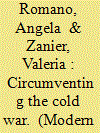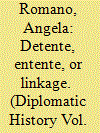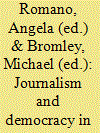|
|
|
Sort Order |
|
|
|
Items / Page
|
|
|
|
|
|
|
| Srl | Item |
| 1 |
ID:
151626


|
|
|
|
|
| Summary/Abstract |
This special issue brings together historians with expertise on China and Western Europe who have the explicit intent of bridging the existing gap between two parallel strands of scholarship, that is, Europe in the Cold War and the history of Socialist China, and combining the different perspectives and approaches of international, diplomatic, business, and cultural historiographies. The contributors’ lively interaction and close collaboration has been the key to the conceptual development of a broader view of the relations between West European countries and Socialist China in the early decades of the Cold War, as well as of China's policy towards the capitalist world before the Reform and Opening era.
|
|
|
|
|
|
|
|
|
|
|
|
|
|
|
|
| 2 |
ID:
090665


|
|
|
|
|
| Publication |
2009.
|
| Summary/Abstract |
A significant relaxation of tensions between East and West occurred after the mid-sixties. Between 1963 and 1968 an increasing dialogue between the superpowers started to develop. Its genesis was in the Soviet achievement, in 1964-65, of the second-strike capability on nuclear weapons, which meant the possibility of mutual assured destruction (MAD) in case of war. The imminent strategic parity between the superpowers created the balance of terror-deterrence-and engendered the political will to pursue limitation to the nuclear armaments race and to define rules to manage the nuclear arsenal. In October 1966, duringa speech in New York, U.S. President Lyndon B. Johnson invited the Soviet Union to resume the détente process by agreeing on military troop reductions on both sides in order to create an increasing reconciliation in Europe.2 Two years later, on July 1, 1968, the Nonproliferation Treaty was signed and created the basis for managing the world nuclear arsenal.
|
|
|
|
|
|
|
|
|
|
|
|
|
|
|
|
| 3 |
ID:
067904


|
|
|
|
|
| Publication |
London, Routledge, 2005.
|
| Description |
xv, 205p.
|
| Series |
Routledge media, culture and social change in Asia
|
| Standard Number |
0415355567
|
|
|
|
|
|
|
|
|
|
|
|
Copies: C:1/I:0,R:0,Q:0
Circulation
| Accession# | Call# | Current Location | Status | Policy | Location |
| 050804 | 079.5/ROM 050804 | Main | On Shelf | General | |
|
|
|
|
| 4 |
ID:
151629


|
|
|
|
|
| Summary/Abstract |
This article focuses on France's policy towards Socialist China in the decade preceding the spectacular and well-studied decision by President Charles de Gaulle to officially recognize the People's Republic of China (PRC). It argues that since the mid-1950s successive French governments discreetly orchestrated a process of rapprochement with the Communist authorities in Beijing. The article demonstrates that, at a time when the international situation discouraged steps towards official relations, the French government used commercial diplomacy as a means to open unofficial diplomatic channels with the Chinese and prepare the ground for future recognition. Relying mostly on French archival sources, this article brings to light evidence of the evolution of French diplomacy's thinking about Socialist China and assesses the rationales behind the French government's growing determination to normalize relations with it. It argues that the intensifying contest among European countries to reach out to Beijing, concerns about the PRC's appeal to developing countries, and an early appraisal of Sino-Soviet rivalry prompted French authorities to work for Sino-French rapprochement, while, at the same time, annoyance at the White House's obstinate refusal to revise its reading of Cold War dynamics weakened France's disposition to fall into line with American demands to maintain a harsh stance towards the PRC.
|
|
|
|
|
|
|
|
|
|
|
|
|
|
|
|
|
|
|
|
|